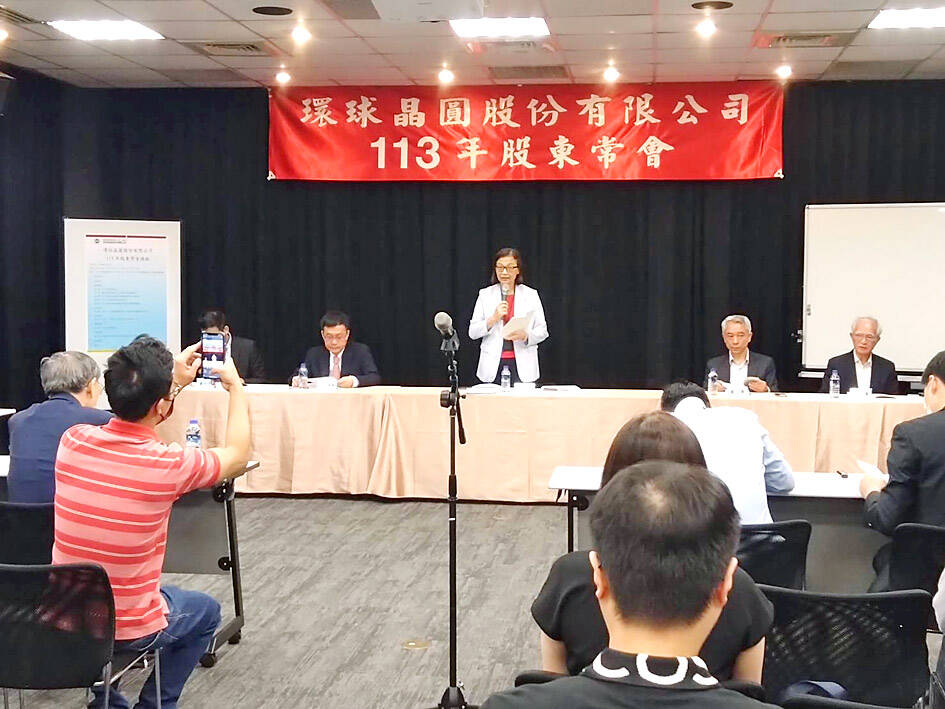GlobalWafers Co (環球晶圓), the world’s third-largest silicon wafer supplier, yesterday said revenue would increase at a much slower pace this year due to customers’ inventory adjustments and lackluster chip demand for smartphones, vehicles and industrial devices.
“The pickup in the second quarter was much weaker than we had thought,” GlobalWafers chairwoman Doris Hsu (徐秀蘭) told reporters following the firm’s annual general meeting. “We had expected a V-shape rebound, but that did not happen, and customers remain conservative about placing new orders due to high inventories.”
Another weak spot is the company’s compound semiconductor business — which includes the production of silicon carbide and gallium nitride chips — due to sagging electric vehicle demand and rapid growth in new capacity from China, Globalwafers said.

Photo: Grace Hung, Taipei Times
Revenue from the compound semiconductor business is expected to grow about 50 percent annually, rather than doubling or tripling as previously estimated, it said.
The only bright spots would be in artificial intelligence and high-performance computing applications, which propel demand for advanced memory chips such as high-bandwidth memory and DRAM chips, and in turn GlobalWafers’ advanced epitaxial wafers, it said.
The company said it anticipates better prospects next year, with customers’ inventory returning to healthy levels and PC replacement demand expected to stimulate chip consumption.
Separately, GlobalWafers said the EU Commission had issued an assignment decree awarding the firm’s Italian subsidiary MEMC Electronic Materials SpA a research-and-development grant of up to 103 million euros (US$110.4 million).
The Novara-based subsidy accounts for about 25 percent of the total investment of 420 million euros for the company’s planned 12-inch production facility in Italy.
“MEMC’s new fab will fill a critical gap in the European semiconductor supply chain that until now has been highly dependent on imports to supply wafers for the most advanced technology platforms,” GlobalWafers said.
The new plant would support the creation of downstream products, including sensors, logic applications, power and communications applications. It is set to ramp up production in the second half of next year, with an installed capacity of 100,000 wafers a month.
GlobalWafers expects the fab to help expand its market share in Europe from 30 percent currently, it said.
The investment is expected to create 600 construction jobs and 150 long-term company jobs, it added.

Shiina Ito has had fewer Chinese customers at her Tokyo jewelry shop since Beijing issued a travel warning in the wake of a diplomatic spat, but she said she was not concerned. A souring of Tokyo-Beijing relations this month, following remarks by Japanese Prime Minister Sanae Takaichi about Taiwan, has fueled concerns about the impact on the ritzy boutiques, noodle joints and hotels where holidaymakers spend their cash. However, businesses in Tokyo largely shrugged off any anxiety. “Since there are fewer Chinese customers, it’s become a bit easier for Japanese shoppers to visit, so our sales haven’t really dropped,” Ito

The number of Taiwanese working in the US rose to a record high of 137,000 last year, driven largely by Taiwan Semiconductor Manufacturing Co’s (TSMC, 台積電) rapid overseas expansion, according to government data released yesterday. A total of 666,000 Taiwanese nationals were employed abroad last year, an increase of 45,000 from 2023 and the highest level since the COVID-19 pandemic, data from the Directorate-General of Budget, Accounting and Statistics (DGBAS) showed. Overseas employment had steadily increased between 2009 and 2019, peaking at 739,000, before plunging to 319,000 in 2021 amid US-China trade tensions, global supply chain shifts, reshoring by Taiwanese companies and

Taiwan Semiconductor Manufacturing Co (TSMC, 台積電) received about NT$147 billion (US$4.71 billion) in subsidies from the US, Japanese, German and Chinese governments over the past two years for its global expansion. Financial data compiled by the world’s largest contract chipmaker showed the company secured NT$4.77 billion in subsidies from the governments in the third quarter, bringing the total for the first three quarters of the year to about NT$71.9 billion. Along with the NT$75.16 billion in financial aid TSMC received last year, the chipmaker obtained NT$147 billion in subsidies in almost two years, the data showed. The subsidies received by its subsidiaries —

Taiwan Semiconductor Manufacturing Co (TSMC) Chairman C.C. Wei (魏哲家) and the company’s former chairman, Mark Liu (劉德音), both received the Robert N. Noyce Award -- the semiconductor industry’s highest honor -- in San Jose, California, on Thursday (local time). Speaking at the award event, Liu, who retired last year, expressed gratitude to his wife, his dissertation advisor at the University of California, Berkeley, his supervisors at AT&T Bell Laboratories -- where he worked on optical fiber communication systems before joining TSMC, TSMC partners, and industry colleagues. Liu said that working alongside TSMC